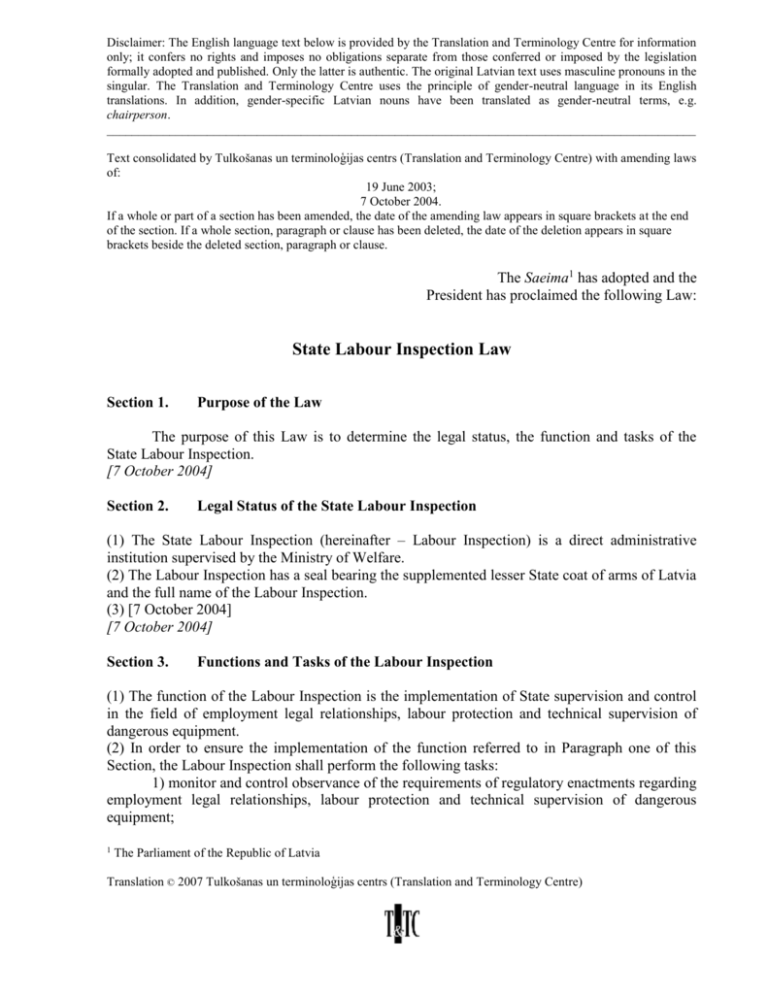to the State Labour Inspection Law
advertisement

Disclaimer: The English language text below is provided by the Translation and Terminology Centre for information only; it confers no rights and imposes no obligations separate from those conferred or imposed by the legislation formally adopted and published. Only the latter is authentic. The original Latvian text uses masculine pronouns in the singular. The Translation and Terminology Centre uses the principle of gender-neutral language in its English translations. In addition, gender-specific Latvian nouns have been translated as gender-neutral terms, e.g. chairperson. ______________________________________________________________________________________________ Text consolidated by Tulkošanas un terminoloģijas centrs (Translation and Terminology Centre) with amending laws of: 19 June 2003; 7 October 2004. If a whole or part of a section has been amended, the date of the amending law appears in square brackets at the end of the section. If a whole section, paragraph or clause has been deleted, the date of the deletion appears in square brackets beside the deleted section, paragraph or clause. The Saeima1 has adopted and the President has proclaimed the following Law: State Labour Inspection Law Section 1. Purpose of the Law The purpose of this Law is to determine the legal status, the function and tasks of the State Labour Inspection. [7 October 2004] Section 2. Legal Status of the State Labour Inspection (1) The State Labour Inspection (hereinafter – Labour Inspection) is a direct administrative institution supervised by the Ministry of Welfare. (2) The Labour Inspection has a seal bearing the supplemented lesser State coat of arms of Latvia and the full name of the Labour Inspection. (3) [7 October 2004] [7 October 2004] Section 3. Functions and Tasks of the Labour Inspection (1) The function of the Labour Inspection is the implementation of State supervision and control in the field of employment legal relationships, labour protection and technical supervision of dangerous equipment. (2) In order to ensure the implementation of the function referred to in Paragraph one of this Section, the Labour Inspection shall perform the following tasks: 1) monitor and control observance of the requirements of regulatory enactments regarding employment legal relationships, labour protection and technical supervision of dangerous equipment; 1 The Parliament of the Republic of Latvia Translation © 2007 Tulkošanas un terminoloģijas centrs (Translation and Terminology Centre) 2) control how employers and employees mutually fulfil the obligations determined by employment contracts and collective agreements; 3) promote co-operation between employers and employees; 4) take measures to facilitate the prevention of differences of opinion between employers and employees; 5) research matters of employment legal relationships, labour protection and technical supervision of dangerous equipment; 6) carry out investigation of accidents at work and perform uniform registration thereof in accordance with procedures prescribed by regulatory enactments; 7) participate in investigation of cases of occupational diseases in accordance with procedures prescribed by regulatory enactments; 8) investigate accidents with dangerous equipment in accordance with procedures prescribed by the Cabinet; 9) register dangerous equipment in accordance with procedures prescribed by regulatory enactments; 10) issue permits for the commencement of operation of dangerous equipment; 11) control work equipment at workplaces, the utilisation of personal and collective worker protection equipment, utilisation of substances harmful or dangerous to health, and the observance of technological processes in conformity with the requirements of regulatory enactments; 12) as set out in regulatory enactments, carry out market supervision of equipment, workplace tools, and personal and collective worker protection equipment; 13) provide free consultations to employers, employees and possessors of dangerous equipment regarding the requirements of regulatory enactments with respect to employment legal relationships, labour protection, and technical supervision of dangerous equipment; 14) issue licences to legal persons who conduct training of employees regarding labour protection, the preparation of labour protection specialists, and raising of their qualification; 15) organise the formation and ensure the operation of a national point of contact for the European Agency for Safety and Health at Work; and 16) issue and reregister registration certificates, extend the term of validity thereof or cancel such certificates for merchants who wish to perform industrial use of explosives work, provide pyrotechnical services, produce (manufacture) and repair electro-shock devices, and store pyrotechnical articles, explosives, detonators or the accessories thereof intended for the performance of the referred to work and for the provision of services. [7 October 2004] Section 4. Areas under the Supervision and Control of the Labour Inspection (1) The following shall be subject to the supervision and control of the Labour Inspection: 1) merchants, State and local government institutions, religious and public organisations; 2) employers and their authorised persons, in conformity with the duties and authorisation entrusted to them; and 3) workplaces of undertakings (organisational units in which employers employ employees), as well as any other places in an undertaking that are accessible to employees in the course of their work (hereinafter – objects under supervision and control). (2) Dangerous equipment and possessors of such equipment shall be subject to the supervision and control of the Labour Inspection. Translation © 2007 Tulkošanas un terminoloģijas centrs (Translation and Terminology Centre) 2 Section 5. Officials of Labour Inspection (1) Officials of the Labour Inspection shall be the director of the Labour Inspection and State labour inspectors at all levels. Officials of the Labour Inspection shall be State civil servants. (2) Officials of the Labour Inspection have the right to: 1) upon presentation of a service identification document, at any time of day without prior notification and without receiving permission, also in the absence of the employer or possessor of dangerous equipment: a) to visit and inspect objects under the supervision and control of such officials, and b) to check the work process, working environment and labour protection measures; 2) to carry out examination, control and investigation, or to request the information necessary in order to verify that the requirements of regulatory enactments are observed, and for this purpose: a) to question employers, possessors of dangerous equipment, employees and other persons regarding matters of employment legal relationships, labour protection and technical supervision of dangerous equipment; b) to request, accounting, registration or other documents that are necessary, in accordance with regulatory enactments regarding employment legal relationships, labour protection and technical supervision of dangerous equipment, to verify that the documents conform to regulatory enactments, as well as to request copies and extracts of such documents; c) to request information necessary for the Labour Inspection to resolve questions of employment legal relationships, labour protection and technical supervision of dangerous equipment; d) to take measurements of work environment factors, to photograph, make audio and video recordings, as well as take samples of materials and substances for analysis; and e) to invite specialists for the performance of specific tasks; 3) to invite employers, possessors of dangerous equipment, employees or other natural persons, or representatives of legal persons to the Labour Inspection in order to obtain information from them regarding matters of employment legal relationships, labour protection and technical supervision of dangerous equipment, or to provide to such persons information, explanations and other kinds of assistance on such matters; 4) to organise meetings of employers, possessors of dangerous equipment, representatives of organisations of employers and employees, and other representatives of legal persons and natural persons in order to discuss matters of employment legal relationships, labour protection and technical supervision of dangerous equipment; 5) to be provided by employers and possessors of dangerous equipment with such commensurate support as is necessary to perform the task of the Labour Inspection and which support is commensurate with the specific nature, location of the object to be inspected, and nature and duration of examination to be performed; 6) to take decisions regarding matters of employment legal relationships, labour protection and technical supervision of dangerous equipment, as well as to issue warnings and orders to employers or possessors of dangerous equipment; Translation © 2007 Tulkošanas un terminoloģijas centrs (Translation and Terminology Centre) 3 7) to suspend the activities of undertakings in accordance with regulatory enactments regarding the procedures for suspension of activities of undertakings, institutions and organisations; 8) to impose, in accordance with the procedures prescribed for the examination of administrative violations, administrative sanctions on employers and possessors of dangerous equipment, as well as on other persons. (3) Decisions taken, orders given and warnings issued by officials of the Labour Inspection, within the scope of competence determined by this Law, shall be observed by all legal persons and natural persons who are subject to the supervision and control of the Labour Inspection; 9) to control whether employers and possessors of dangerous equipment perform effective measures in order to ensure the fulfilment of Labour Inspection orders, and take into account expressed warnings; and 10) in accordance with the procedures specified in regulatory enactments, to issue to law enforcement institutions materials regarding the violation of regulatory enactments in respect of employment legal relationships, labour protection and technical supervision of dangerous equipment. [7 October 2004] Section 6. Director of Labour Inspection (1) Candidates for the position of Director of the Labour Inspection (hereinafter – Director), upon recommendation by the Minister for Welfare, shall be approved by the Cabinet. The Director shall be appointed to office and removed from office by the Minister for Welfare, observing the requirements specified in the State Civil Service Law. (2) The Director shall: 1) manage the Labour Inspection and be responsible for performance of the tasks of the Labour Inspection; 2) approve the annual operating programme and calendar plan of the Labour Inspection; 3) determine the structure of the Labour Inspection; 4) determine the duties of officials and employees of the Labour Inspection and supervise their activities; 5) examine complaints and take decisions regarding the actions of officials of the Labour Inspection; and 6) represent the Labour Inspection without special authorisation. Section 7. Procedures for Financing the Labour Inspection (1) The Labour Inspection shall be financed from the State budget, and it has State budget account at the Treasury. (2) Monetary administrative penalties imposed by the Labour Inspection shall be included in the general revenue of the State basic budget. [7 October 2004] Translation © 2007 Tulkošanas un terminoloģijas centrs (Translation and Terminology Centre) 4 Section 8. Prohibition to Disclose Information Officials and employees of the Labour Inspection, during the performance of official duties, as well as after termination or discontinuation of employment relationship with the Labour Inspection, shall not unlawfully disclose the following restricted access information: 1) information related to case materials of submissions and complaints examined by the Labour Inspection; 2) information regarding the register of dangerous equipment; 3) commercial secrets regarding work processes that have become known to officials and employees during performance of their official duties; 4) information regarding persons who have submitted complaints regarding violations of regulatory enactments, as well as the information that the inspection has been performed as a result of the receipt of such complaint; and 5) information regarding merchants who request registration certificates. [7 October 2004] Section 9. Provision of Information to Other Persons (1) Officials of the Labour Inspection, in accordance with regulatory enactments regarding freedom of information, shall ensure public access to the information that is under their control. 2) The Labour Inspection shall co-operate with competent institutions of the European Union Member States which institutions monitor and control the observance of regulatory enactments in the area of employment legal relationships, labour protection and technical supervision of dangerous equipment. Such co-operation shall in particular relate to the provision of information with respect to the sending of employees to a relevant European Union Member State, and such information shall be provided free of charge. Section 10. Provision of Information to the Labour Inspection (1) Direct and indirect administrative institutions shall provide to the Labour Inspection free of charge the information necessary for performance of its function and tasks. (2) Medical treatment institutions and law enforcement institutions, upon request of the Labour Inspection, shall provide free of charge information under their control that is necessary for the investigation of accidents at work and cases of occupational diseases, as well as for investigation of accidents with dangerous equipment. (3) The procedures for the exchange of operative information shall be determined by the Cabinet. [7 October 2004] Section 11. Right to Dispute or Appeal of Administrative Acts issued by Labour Inspection Officials (1) A person who considers that a particular administrative act restricts his or her lawful interests, is entitled to dispute, according to the procedures specified by law, by submitting a complaint to the director of the State Labour Inspection, the decisions, orders given or warnings issued by State labour inspectors of all levels. The decision of the director may be appealed to a court according to the procedures specified by law. Translation © 2007 Tulkošanas un terminoloģijas centrs (Translation and Terminology Centre) 5 (2) The submitting of a complaint to the director of the State Labour Inspection or the submission of an application to a court shall not suspend the execution of a State Labour Inspection official decision, except in cases where execution is suspended by a written decision of the person examining the submission or application. [19 June 2003] Transitional Provisions 1. With the coming into force of this Law, the Law On State Labour Inspection (Collection of Laws and Regulations, 17.05.39, No. 12; Latvijas Republikas Augstākās Padomes un Valdības Ziņotājs, 1993, No. 20/21; Latvijas Republikas Saeimas un Ministru Kabineta Ziņotājs, 1994, No. 16; 1995, No. 8; 1996, No. 24) is repealed. 2. Until the date of coming into force of new Cabinet regulations, but not later than 31 May 2002, Cabinet Regulation No. 157 of 30 April 1996, Regulations Regarding Procedures of Investigation and Recording of Accidents with Dangerous Equipment, shall apply. 3. Until the date of coming into force of new Cabinet regulations, but not later than 31 December 2002, Cabinet Regulation No. 260 of 21 July 1998, Procedures by which Permits for Work with Explosives and Permits for Establishment of Warehouses for Explosives are to be Issued, shall apply. 4. Section 3, Paragraph fourteen of this Law shall be in force until 31 December 2002. 5. If the administrative acts issued by State Labour Inspection officials, which has come into effect prior to the day of the coming into force of the Administrative Procedure Law and for which the time period for dispute or appeal has not ended, and on the day of the coming into force of the Administrative Procedure Law longer time periods for dispute or appeal have been determined, the longer time periods shall be applied. [19 June 2003] This Law comes into force on 1 January 2002. This Law has been adopted by the Saeima on 13 December 2001. On behalf of the President, Chairperson of the Saeima J. Straume Rīga, 28 December 2001 Translation © 2007 Tulkošanas un terminoloģijas centrs (Translation and Terminology Centre) 6 Transitional Provisions Regarding Amendments to the State Labour Inspection Law Transitional Provision (regarding amending law of 19 June 2003) This Law shall come into force simultaneously with the coming into force of the Administration Procedure Law. Translation © 2007 Tulkošanas un terminoloģijas centrs (Translation and Terminology Centre) 7







